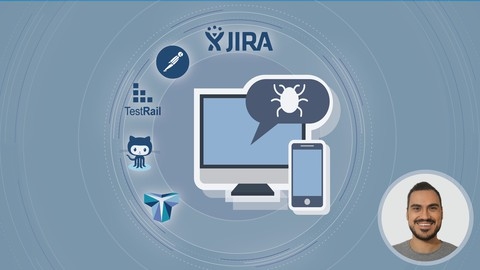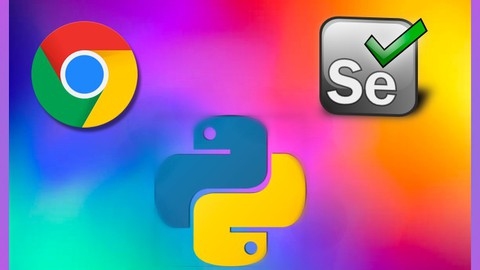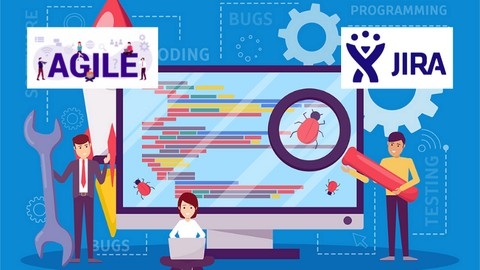Software testing is a crucial part of the software development process, ensuring that applications function correctly, meet user expectations, and are free from defects.
By learning software testing, you can acquire valuable skills that are in high demand across various industries, opening doors to exciting career opportunities as a Quality Assurance (QA) professional.
Finding a comprehensive and practical software testing course on Udemy can be a challenging task, with so many options available.
You’re likely seeking a course that goes beyond theory, providing real-world experience and hands-on projects to solidify your understanding.
You’re looking for a program that will equip you with the skills and knowledge needed to confidently navigate the world of software testing and excel in your chosen career path.
We’ve meticulously reviewed numerous Udemy courses and have identified MasterClass Software Testing with Jira & Agile -Be a QA Lead as the best overall course.
This program offers a comprehensive overview of software testing, covering various methodologies, tools, and techniques.
It also features hands-on projects that allow you to apply your knowledge in real-world scenarios.
This course delves into the Agile process and its implementation using Jira, a popular project management tool, equipping you with the skills needed to thrive in modern development environments.
This is just the beginning of our recommendations for the best software testing courses on Udemy.
Keep reading to discover other excellent options, tailored to different learning levels, career goals, and areas of specialization within software testing.
Whether you’re interested in manual testing, automation testing, performance testing, or specific tools like Selenium, we have you covered.
MasterClass Software Testing with Jira & Agile -Be a QA Lead
This course provides a comprehensive overview of software testing with a focus on using Jira and Agile methodologies.
You will learn about the role of a QA in an Agile Scrum project, working with real-world examples in Jira.
The course starts by introducing you to the Agile Scrum process and how to set up a project in Jira.
You will learn about creating epics, user stories, components, and releases.
Additionally, you’ll understand the importance of backlog refinement meetings and defining acceptance criteria.
Moving forward, you will explore the concept of sprints, Scrum boards, and workflows in Jira.
The course covers creating bugs and analyzing sprint reports.
It also highlights the significance of retrospectives and Kanban boards in Agile practices.
To enhance your testing skills, the course delves into designing test cases based on project architecture and API-driven backends.
You will learn different types of testing involved in a single scenario and how to think out of the box when given a requirement.
The course introduces you to the Xray plugin in Jira, where you will learn to create test cases, preconditions, test sets, and test plans.
You will also understand the importance of test execution and its link with test plans.
Furthermore, you will gain insights into the Software Testing Life Cycle, including test plan preparation, test case development, test environments, requirement traceability matrix, and test closure activities.
The course covers the defect life cycle in depth, teaching you how to create defects, understand severity and priority, verify app server logs, and retest defects effectively.
You will also learn about various types of testing, such as regression testing, smoke/sanity testing, integration testing, component testing, verification and validation, load testing, and stress testing.
The course distinguishes between functional and non-functional requirements testing and explores the differences between black-box and white-box testing.
Additionally, you will go through an end-to-end testing of an ecommerce application using the Bugzilla tool, where you will create test cases, execute them, and log bugs.
The course also includes a section on top QA behavioral interview questions and a bonus lecture on Unix material for beginners.
Optionally, you can learn SQL queries using MySQL, covering topics like creating databases, tables, inserting and retrieving records, logical operators, regular expressions, and wildcards.
Learn JMETER from Scratch on Live Apps -Performance Testing
This course is a comprehensive guide to learning JMeter, a popular open-source load testing tool.
You’ll start with an introduction to JMeter, understanding its advantages over other performance testing tools, and how to install and configure it.
Next, you’ll dive into recording scripts for the application under test using JMeter’s recording capabilities, including recording in Chrome with the Blazemeter extension.
This hands-on approach will help you understand how to capture real user scenarios.
Once you have your scripts, you’ll learn how to put load on the application and analyze performance metrics.
This includes understanding the importance of the Thread Group, applying different load patterns, and using various listeners to monitor results and gather performance data.
The course covers advanced techniques like using additional plugins for advanced load configurations, working with HTTP Cookie Manager to capture sessions, and using assertions to validate test results.
You’ll also explore JMeter controllers, which help track performance of different application modules.
Controllers like Transaction, Simple, Interleave, Runtime, Random, If, and Loop controllers are covered, enabling you to simulate real-world scenarios and stress testing.
Timers in JMeter, which control the pace of requests, are another key topic, including the importance of the Constant Throughput Timer.
Regular expressions play a crucial role in extracting dynamic data from responses.
You’ll learn why they’re needed and how to use them effectively, including combining multiple expressions into a single extractor.
Data-driven testing is made easy with JMeter’s ability to read data from external sources.
You’ll learn how to create HTTP request samplers from scratch and data-drive the application.
The course dives into BeanShell scripting in JMeter, covering its significance, adding conditional logic, and working with variables like ctx and prev to access sampler results.
For advanced users, handling dynamic responses through correlation and regular expressions is covered, using a flight reservation example.
Running tests in non-GUI mode, monitoring results, and the importance of Blazemeter for cloud execution are also discussed.
JMeter’s distributed mode, which allows running tests across multiple machines, is explored in-depth, including setting up a client-server architecture.
Server monitoring is crucial during load testing, so the course covers using tools like YourKit Profiler to analyze server performance graphs.
Software Testing Masterclass (2024) - From Novice to Expert
This course provides a comprehensive overview of software testing, covering everything from the basics to advanced concepts and tools.
You’ll start by learning the fundamentals, including the role of testing in software development, the software development life cycle, testing activities, bug reporting, and test case creation.
The course then dives into advanced testing techniques like equivalence partitioning, boundary value analysis, decision tables, state transition testing, use case testing, negative testing, smoke testing, sanity testing, regression testing, risk-based testing, and experienced-based testing.
You’ll also learn about static and dynamic testing, test planning and estimation, and development and testing environments.
To help you gain hands-on experience, the course includes tutorials on creating mind maps and test cases, as well as sections dedicated to backend testing, API testing with Postman, web application testing, and mobile app testing.
You’ll work with tools like Jira for bug reporting, GitHub for version control, Confluence for documentation, TestMonitor and TestRail for test management, Miro for collaboration, and Charles Proxy for debugging.
The course even covers SQL for database testing, providing you with a valuable skill set for testing data-driven applications.
Additionally, you’ll learn about freelancing opportunities in software testing, allowing you to start earning money immediately.
For those seeking a deeper understanding, the course explores various process management methodologies like Waterfall, V-Model, and Agile, as well as specialized testing areas like localization, accessibility, usability, and A/B testing.
You’ll also get insights into test automation.
To prepare you for job interviews, the course includes sections on creating a great software tester resume and practicing common interview questions.
The advanced API testing with Postman section covers topics like path and query variables, global and environment variables, writing Postman tests, JSON parsing, dynamic variables, advanced testing techniques, and running tests with the Collection Runner.
Throughout the course, you’ll have access to valuable resources like software testing newsletters, blogs by industry experts like Michael Bolton, James Bach, Katrina the Tester, Ajay, Anne-Marie Charrett, Steve Smith, and Angie Jones, as well as a student community for collaboration and support.
Software Testing: Get A Tech Job in Software Testing 2024
This course equips you with the skills needed to launch a career in software testing.
You’ll start by learning the fundamentals of software testing, including what it is and the role of a tester within a technology organization.
The course covers various methodologies used in software development, such as the Software Development Life Cycle (SDLC), Waterfall, and Agile.
You’ll dive into the Software Testing Life Cycle (STLC) and learn how to write test cases through hands-on exercises.
Different types of testing are explored, including manual versus automation, as well as black box and white box testing.
This knowledge will help you understand the testing process from multiple angles.
One unique aspect of the course is its focus on earning money as a freelance tester.
You’ll learn about online websites where you can find freelance testing gigs or even remote testing jobs.
This practical approach can help you gain real-world experience while earning an income.
The course also covers the importance of identifying and reporting bugs, including the use of bug tracking tools.
As you progress, you’ll learn how to craft an effective resume and search for software testing jobs.
Interview preparation is a crucial component, with guidance on how to ace software testing interviews.
Additionally, the course provides valuable materials worth money, potentially opening up money-making opportunities in the field of software QA testing.
Top 150+ QA Automation Interview Questions & Resume Tips
This course prepares you for QA automation interviews by covering a comprehensive range of topics.
You’ll start with an introduction and overview of how the interview questions are structured.
The first major module focuses on a mix of Selenium and Core Java interview questions.
It’s divided into six parts, covering various aspects of these technologies.
This will help you build a strong foundation in automation testing using Selenium and Java.
Next, you’ll dive into automation framework interview questions related to TestNG and Cucumber.
These popular testing frameworks are essential for any automation engineer, and this module will equip you with the knowledge to tackle relevant questions.
The course also includes a dedicated module on API testing interview questions.
With the increasing importance of API testing, this section will ensure you’re well-versed in this domain.
Core WebDriver API interview questions are covered in another module, helping you understand the intricacies of this widely-used automation tool.
For those interested in non-functional testing and SQL, there’s a module dedicated to these areas.
You’ll learn about SQL interview questions, covering various aspects of database testing.
Manual testing and QA behavioral interview questions are also included, ensuring you’re prepared for both technical and non-technical aspects of the interview process.
Additionally, the course offers a module on top Java coding interview programs with explanations.
You’ll learn how to solve common coding problems, such as finding the sum of array elements, printing multiplication tables, and more.
Rounding out the course are sections on core Java miscellaneous interview questions, resume suggestions, and what to do next.
These will help you solidify your Java knowledge and present yourself effectively during the job search process.
Manual Software Testing: Complete Course with Practical Labs
This comprehensive course covers all the essential topics you need to kickstart your career in manual software testing.
You’ll start by learning the fundamentals of software testing, including its importance, key concepts like static and dynamic testing, quality control, quality assurance, testing terminologies, types of testing, and testing principles.
The course provides a solid foundation by explaining what manual testing is, how it differs from automated testing, the tools used, and how you can learn it online.
One of the standout features of this course is its practical approach.
You’ll learn how to write industry-standard test cases for various applications, including web pages, mobile apps, and desktop software.
The instructor guides you through real-world examples, teaching you to consider assumptions, test criteria, steps, expected results, and actual results.
The course also introduces you to popular project management tools like Trello, Bugzilla, and Jira.
You’ll learn how to create accounts, log bugs, and work with these tools effectively.
Additionally, you’ll explore static review techniques and automation tools like Postman for API testing.
Interestingly, the course covers the Agile methodology, its 12 principles, and practical exercises, ensuring you’re well-versed in this widely adopted approach.
It also includes a section on top manual testing interview questions and answers, preparing you for job interviews.
Furthermore, you’ll gain insights into project planning, time management, resource management, budget management, and best practices for project management.
The course even touches upon the ISTQB certification, its eligibility criteria, syllabus, and levels, providing a pathway for professional growth.
As a bonus, the course offers a free section on OpenAI and ChatGPT, exploring their applications, features, and potential in manual software testing.
You’ll learn how to leverage AI for tasks like test case generation, test data preparation, and defect reporting.
Throughout the course, you’ll find quizzes and multiple-choice questions to reinforce your understanding of the key concepts.
Best QA Manual Software Testing: Live Project+Agile+Jira+API
This course starts by explaining the roles and responsibilities within a QA team, giving you an understanding of how testers fit into the broader software development process.
You’ll learn about two major methodologies for developing software - Agile and Waterfall.
The course emphasizes the increasingly popular Agile approach and how it differs from the traditional Waterfall model.
A key focus is on using Jira, a widely-adopted tool for managing Agile projects.
You’ll install Jira and learn how to create user stories, epics, and defects within it.
This hands-on experience with Jira will be invaluable for transitioning into an Agile team.
The course walks you through a real-world project from start to finish.
You’ll analyze requirements, create test plans and test cases, then perform functional and UI testing on a live application.
This practical experience is supplemented with concepts like boundary value analysis and equivalence partitioning.
As you find defects during testing, you’ll practice writing clear defect reports and understand the defect lifecycle.
The course covers different testing types like integration, regression, and user acceptance testing.
You’ll also learn about environments like dev, staging, and production, as well as the release process.
To prepare for interviews, there are lectures on common questions and sample resumes.
Finally, an entire section is dedicated to API testing - covering API types, how to test APIs, and working through real examples step-by-step.
Python From Scratch & Selenium WebDriver QA Automation 2024
The course starts by teaching you Python from scratch, covering all the fundamentals like variables, data types, control flow, functions, and more.
You’ll learn how to work with files, classes, and even build a basic calculator class as an exercise.
Once you have a solid grasp of Python, the course dives into Selenium WebDriver for browser automation.
You’ll learn how to install and set up Selenium, find elements on web pages using various techniques like CSS and XPath, handle waits, interact with different UI elements like dropdowns and alerts, and work with frames and multiple windows.
The course then walks you through building a test automation framework using the Page Object pattern and pytest for running tests.
You’ll create page objects, write test cases, generate HTML reports with screenshots, and even learn how to run tests in headless browsers.
The course also includes special sections on building a local e-commerce site with WordPress and WooCommerce to practice your automation skills.
You’ll learn how to set up the site, add products, configure coupons, and even test the WooCommerce REST API.
Additionally, there’s a crash course on SQL and MySQL to help you understand databases better, as well as an introduction to the Robot Framework, another popular automation tool.
Throughout the course, you’ll work on practical exercises and real-world examples, ensuring you gain hands-on experience.
The course covers a wide range of topics, from Python fundamentals to advanced automation concepts, making it a comprehensive resource for anyone interested in QA testing and automation.
SDET/Test Architect Essentials -Road to Full stack QA
The course starts by introducing you to the roadmap and providing an overview of the content.
You’ll begin by learning how to convert database results into Java objects using POJO classes and JDBC connections.
This is a crucial skill for data-driven testing.
Next, you’ll dive into the Jackson API to convert these Java objects into JSON file formats, which is essential for working with APIs and modern web applications.
The course then covers Docker, a powerful tool for containerizing applications.
You’ll learn how to integrate Docker with Selenium for running automated tests across different browsers and environments.
Additionally, you’ll learn to create batch files for monitoring server logs and synchronizing tests.
Moving on, the course covers Jenkins, a popular continuous integration tool.
You’ll learn how to integrate Docker tests with Maven and Jenkins, as well as how to create Jenkins pipelines using Groovy scripts.
This is invaluable for implementing continuous integration and delivery (CI/CD) pipelines.
For robust data-driven testing, you’ll learn how to integrate TestNG’s DataProvider with Excel files.
This allows you to parameterize test data and run tests with different data sets.
To optimize your code, the course covers Java Streams, including map, filter, match, and collect operations.
You’ll learn how to use lambda expressions and stream operations to write more concise and efficient code.
Version control is also covered, with a focus on Git commands and GitHub.
You’ll learn how to create repositories, commit changes, handle branches, and resolve merge conflicts.
From data handling to containerization, CI/CD, and version control, you’ll gain practical skills that are in high demand in the industry.
Specialize in QA Manual Testing with Live Project+AGILE+JIRA
The course starts with an introduction to software testing, covering key concepts like testing objectives, principles, and common terminology.
You’ll learn about different types of testing, including functional, non-functional, and user acceptance testing.
The course then dives into the various stages of the testing life cycle, from requirement analysis and test planning to test execution, defect reporting, and test closure.
You’ll get hands-on experience creating test plans, designing test cases using techniques like equivalence partitioning and boundary value analysis, and setting up test environments.
One of the highlights is the practical project where you’ll simulate a real-world testing scenario using a test management tool and JIRA for defect management.
This will give you a taste of what it’s like to work as a tester in an organization, collaborating with different teams and following the testing process from start to finish.
The course also covers agile testing methodologies and provides an overview of automation testing, although the focus is primarily on manual testing.
Additionally, there’s a section dedicated to interview and resume preparation, which can be invaluable for those seeking QA testing roles.
Throughout the course, you’ll have opportunities to apply what you’ve learned through practical exercises, such as writing test cases for Amazon and creating test execution reports.
This hands-on approach can help reinforce the concepts and better prepare you for real-world testing scenarios.
With its combination of lectures, practical exercises, and a simulated project, you can gain a well-rounded understanding of the testing process and develop the skills needed for a career in QA testing.










